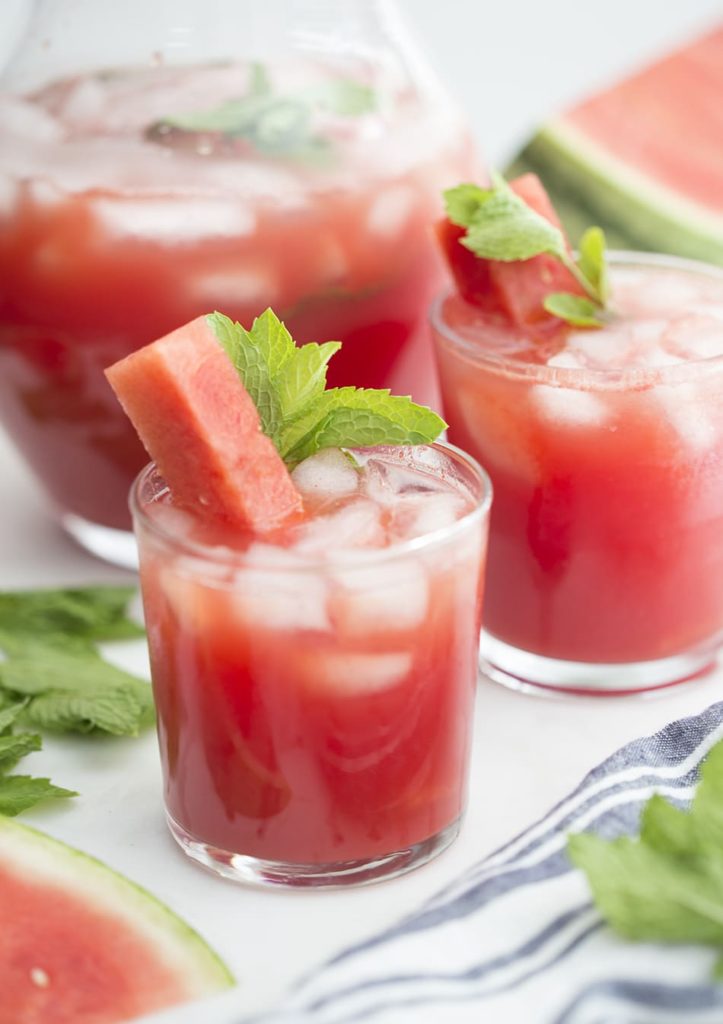
WATERMELON WATER

Watermelon Water
Watermelon consists of mostly water. Hence its name makes perfect sense. Each bite of watermelon contains 92% water and six percent sugar. Watermelon keeps you hydrated, and it is considered a very healthy snack.
Ancient Fruit
Experts believe watermelon was first found ancient Egyptian. The first watermelon harvest probably occurred at least 5,000 years ago. Botanically, watermelons are fruits. Thus, most people think of them as fruits since they’re so sweet and juicy. However, watermelon grows in gardens like vegetables. They are grown like vegetables because they are related to cucumber, squash and pumpkin. Hence, some people think of watermelon as vegetable.
Nutrients
Watermelon is also a good source of vitamin C, beta carotene, and lycopene. It is a refreshing retreat and helps maintain eyesight, keep your skin glowing and boost the immune system. One cup serving which is approximately 154 grams will contain over half cup of water, some fibre and important nutrients including vitamin A and magnesium.
Watermelon is quite low in calories due to high water content. It may provide only 46 calories per cup. This means that a relatively large portion of watermelon contains very few calories. Foods with low calorie density may help with weight loss by promoting fullness and reducing appetite. There is also modest amount of potassium, significant levels of vitamin B6, lots of lycopene, antioxidants and amino acids.
Health Benefits
The high levels of lycopene are very effective at protecting cells from damage and may help reduce the risk of heart diseases. Lycopene has been linked with heart health, bone health and prostate cancer prevention. Its powerful antioxidant properties are thought to be helping inflammation. The redder your watermelon gets, the higher the concentration of lycopene. Beta-carotene and phenolic antioxidant content increases as the watermelon ripens. Beta carotene is an antioxidant found in red-orange fruits and vegetables. It helps with immunity, skin, eye and the prevention of cancer.
Studies show that watermelon extracts help reduce hypertension and lower blood pressure in obese adults. Watermelon may be especially important for older women. Postmenopausal women, a group known to have increased aortic stiffness, who took watermelon extract for six weeks saw decreased blood pressure and arterial stiffness compared to those who did not take watermelon extract.
Hydration
Watermelons help with overall hydration, and that is a great thing. It is said that we can get 20 to 30 percent of our daily fluid needs from our diet. Foods like watermelon is perfect in helping. Furthermore, watermelon water is full of good electrolytes. This can even help prevent heat stroke. The watermelon contains fibre, which encourages a healthy digestive tract and helps keep you regular.
Muscle Soreness
Drinking watermelon water before an intense workout helps reduce next day muscle soreness and heart rate. This can be attributed to watermelon’s amino acids which help improve circulation. Study participants who took citrulline supplements saw a boosted performance with more power production in high-intensity exercise like cycling and sprinting.
Like other fruits and vegetables, watermelons may be helpful in reducing the risk of cancer through their antioxidant properties. Lycopene in particular has been linked to reducing prostate cancer cell proliferation
Watermelon Rind
It is true that many people in China also eat watermelon rinds. Although many people don’t like the flavour watermelon rinds are often cooked as vegetables in China. China produces more watermelons than any other country in the world. The Chinese stir-fry, stew, and even pickle watermelon rinds.

